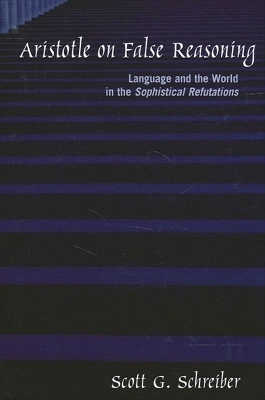
Aristotle on False Reasoning
State University of New York Press (Verlag)
978-0-7914-5659-0 (ISBN)
Presenting the first book-length study in English of Aristotle's Sophistical Refutations, this work takes a fresh look at this seminal text on false reasoning. Through a careful and critical analysis of Aristotle's examples of sophistical reasoning, Scott G. Schreiber explores Aristotle's rationale for his taxonomy of twelve fallacy types. Contrary to certain modern attempts to reduce all fallacious reasoning to either errors of logical form or linguistic imprecision, Aristotle insists that, as important as form and language are, certain types of false reasoning derive their persuasiveness from mistaken beliefs about the nature of language and the nature of the world.
Scott G. Schreiber is Assistant Professor of Philosophy and Director of Classical Studies at St. Norbert College.
List of Abbreviations
Preface Introduction: Reasoning and the Sophistical Refutations
Aristotle on the Kinds of Reasoning
The Sophistical Refutations
Outline of the Book
PART 1: FALLACIES DUE TO LANGUAGE
1: The Power of Names
Naming Is Not Like Counting
"Counters"
"Signifiers"
Conclusion
2: Homonymy and Amphiboly
Introduction: Aristotle's Use of Language
The Six Sources of False Reasoning Due to Language
Homonymy
Homonymy in the Categories
Homonymy in S.E.
Amphiboly
Amphiboly in S.E.
Amphiboly Outside the Organon
Problems with Aristotle's Distinction: The Argument of S.E. 17
Conclusion
3: Form of the Expression
Introduction
Form of the Expression As a Category Mistake
Confusion of Substance with Quantity
Confusion of Substance with Relative
Confusion of Substance with Quality
Confusion of Substance with Time
Confusion of Activity with "Being-Affected"
Confusion of Activity with Quality
Form of the Expression Fallacies That Are Not Category Mistakes
Confusion of a Particular with a Universal
Confusion of One Particular Substance with Another
Confusions Based on Gender Terminations
Form of the Expression and Solecism: Aristotle and Protagoras
Form of the Expression As a Linguistic Fallacy of Double Meaning
4: Composition, Division, and Accent
Difficulties and Procedure
Fallacies Due to Accent
Fallacies Due to Composition and Division (C/D)
C/D Fallacies Are Not Examples of Double Meaning
The Primacy of Oral Speech
Further Examples
Confusing Linguistic Parts and Wholes
C/D Fallacies in the Rhetoric
Conclusion
PART 2: RESOLUTIONS OF FALSE ARGUMENTS
5: Resolutions of False Arguments
Introduction
Principles of Aristotelian Analytical Method
Two Kinds of Resolution
The Principle of Parsimony
Proper Refutations and Their Defects: Ignoratio Elenchi
Resolutions of Fallacies Due to Language
How These Fallacies Violate the Definition of a Refutation
The Unity of Composition and Division: S.E. 23
The Extralinguistic Component of Resolutions to Linguistic Fallacies
PART 3: FALLACIES OUTSIDE OF LANGUAGE
6: Begging the Question and Non-Cause As Cause
Introduction
The Fallacy of Begging the Question
Begging the Question in the Prior Analytics
Begging the Question in Dialectical Reasoning
Begging the Question and Immediate Inferences
Resolutions
The Fallacy of Treating a Non-Cause As a Cause
Conclusion
7: Accident and Consequent
Introduction
Fallacies Due to Accident and Their Resolutions
False Resolutions to Fallacies Due to Accident
False Resolutions by Appeal to Linguistic Equivocation
False Resolutions by Appeal to Oblique Context
False Resolutions by Citing Missing Qualifications
Final Remarks on Double Meaning and Fallacies Due to Accident
Historical Reasons for Treating Fallacies Due to
Accident As Errors of Logical Form
Fallacies Due to Consequent
Introduction
Aristotle's Examples
Conclusion
8: Secundum Quid
Introduction
Two Types of Secundum Quid Fallacy
Resolutions of Secundum Quid Fallacies
Secundum Quid as a Fallacy Outside of Language: Aristotle's Position
Problems with Aristotle's Position
Conclusion
9: Many Questions
Introduction
Disjunctive and Conjunctive Premises
Disjunctive Premises
Conjunctive Premises
Resolutions of Fallacies Due to Many Questions
Homonymy and Amphiboly As Cases of Many Questions
Unity of Predication versus Unity of Definition: The Problem of de Interpretatione
de Interpretatione 5
de Interpretatione 8 and 11
Conclusion
Conclusion and Summary
Appendixes
Notes
Bibliography
Index
| Erscheint lt. Verlag | 18.3.2003 |
|---|---|
| Reihe/Serie | SUNY series in Ancient Greek Philosophy |
| Zusatzinfo | Total Illustrations: 0 |
| Verlagsort | Albany, NY |
| Sprache | englisch |
| Maße | 152 x 229 mm |
| Gewicht | 481 g |
| Themenwelt | Geisteswissenschaften ► Philosophie ► Philosophie Altertum / Antike |
| ISBN-10 | 0-7914-5659-5 / 0791456595 |
| ISBN-13 | 978-0-7914-5659-0 / 9780791456590 |
| Zustand | Neuware |
| Informationen gemäß Produktsicherheitsverordnung (GPSR) | |
| Haben Sie eine Frage zum Produkt? |
aus dem Bereich


